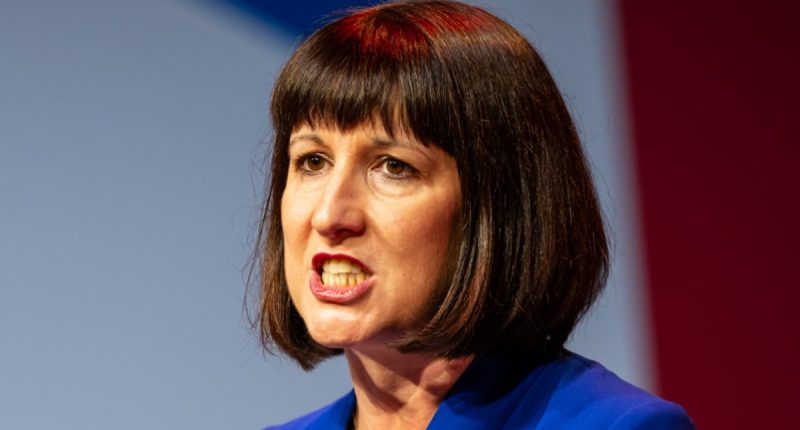Share this @internewscast.com
As the Chancellor lives it up with her fellow G7 finance ministers at the £350-a-night Rimrock Resort Hotel in Canada’s Rocky Mountains, her credibility at home is draining away.
Rachel Reeves’s claims to have fixed the public finances are sounding increasingly delusional as the economic outlook becomes more grim with every passing day.
On Wednesday, the Office for National Statistics announced a shock rise in inflation to 3.5 per cent. Yesterday, it followed this with news of higher-than-expected government borrowing in April of £20.2 billion, the fourth-highest figure for April since monthly records began in 1993.
Then the Government announced it was offering a range of public-sector workers inflation-busting pay rises of up to 4.5 per cent.
Meanwhile, the economy is growing at a derisory rate following last year’s Budget, which clobbered consumers and businesses alike with £40 billion of tax increases.
With his Chancellor 4,400 miles away, the Prime Minister Sir Keir Starmer took the opportunity to undermine her credibility still further by announcing a U-turn on her first major budgetary decision: the axing of the winter fuel allowance.

Rachel Reeves ‘s claims to have fixed the public finances are sounding increasingly delusional as the economic outlook becomes more grim with every passing day

The Chancellor is currently away living it up with her fellow G7 finance ministers at the £350-a-night Rimrock Resort Hotel in Canada ‘s Rocky Mountains (pictured)
Catastrophic
It was a move that left many pensioners shivering in their homes last winter – and had a catastrophic effect on Labour’s performance in local elections earlier this month.
But reinstating this benefit will cost the Government £1.4 billion – which it can ill afford at a time when it’s spending billions more than it raises in taxes every month.
This is despite collecting an extra £1.7 billion last month alone from the rise in employer’s National Insurance, a move which has had a devastating impact on business confidence and led to an increase in unemployment.
The economy grew by 0.7 per cent in the first quarter of this year after flatlining in the second half of 2024, but Donald Trump’s tariff mayhem – coupled with that inflationary surge – point to the recovery being shortlived.
The Chancellor frequently boasts that on her watch the Bank of England has lowered interest rates four times to the current 4.25 per cent, but the prospects of further cuts are vanishing before our eyes.
The Bank’s chief economist Huw Pill warned this week that the process of getting price increases under control, was far from over, and argued that interest rate cuts had come too speedily.
We may not yet be the new Greece, which saw rioting in the streets when it came close to bankruptcy in 2011, but the auguries are not good.
There has been a surge in gilt yields in recent months, for example, a sure sign that the bond markets are losing confidence in the British economy as, in uncertain times, investors sell government bonds, sending the prices down and the yield up.

With his Chancellor 4,400 miles away, the Prime Minister Sir Keir Starmer took the opportunity to undermine her credibility still further by announcing a U-turn on her first major budgetary decision: the axing of the winter fuel allowance

The Bank’s chief economist Huw Pill warned this week that the process of getting price increases under control, was far from over, and argued that interest rate cuts had come too speedily
This is what happened during the ‘Truss tantrum’ in the autumn of 2022, which drove the then prime minister from office. In three short weeks, the return on the ten-year bond soared from 3.03 per cent to 4.42 per cent, a shift that was so sudden and shocking it endangered UK’s pension funds and the Bank of England was forced to stage a lifeboat operation.
Remarkably, under Reeves’ stewardship, bond rates have moved even higher than they were under Liz Truss. The cost of ten-year borrowing currently stands at 4.78 per cent up from 4.62 per cent a month ago. The long-term 30-year-bond price has jumped to 5.56 per cent.
The Chancellor’s response has been to suggest this is due to international conditions.
But much of the pain now faced by the Government is self-made. It brought industrial peace with the public-sector trade unions soon after taking office by offering pay settlements that totalled £9.4 billion – none of them linked to improvements in productivity.
A year later it is repeating the error. The Institute for Fiscal Studies cautioned last night that the 3.6 per cent award for NHS staff and a 4 per cent increase for teachers and other workers announced yesterday will require ‘further savings to be found elsewhere’.
The truth is that the Government is digging a fiscal grave for itself with these unaffordable pay deals.
If Reeves is to keep her promise to keep taxes and current spending in balance and only borrow for investment, she has no choice but to increase taxes or to cut spending.

Remarkably, under Reeves’ stewardship, bond rates have moved even higher than they were under Liz Truss
Threadbare
Given that the Government now appears to be in the business of reversing previous cuts rather than making any more, the former approach would appear to be the preferred option.
Lower than forecast economic growth and the rocketing cost of servicing the national debt – which stands at 100 per cent of national output and commands interest payments of more than £100 billion a year – speedily wiped out the £10 billion ‘headroom’ Reeves had left herself in her October Budget.
As a result, we should brace ourselves for a tax-raising budget in November.
The Chancellor’s vows to not come back for more, after the £40 billion shocker last year, are now looking exceedingly threadbare.
So, far from ‘fixing the foundations’ and restoring stability to public finances, Reeves is presiding over a looming economic disaster.
For anaemic growth and the spiralling cost of borrowing are not her only problems, the Government has also entered into a series of unfunded commitments.
The cost of its new deal with Europe, which will require Britain to pay into Brussels coffers, has not been disclosed but one estimate puts the bill at £16 billion for the first year alone.
The urgent need to boost defence spending is another headache. The Government engineered a short-term fix by slashing overseas aid and putting the savings into the Armed Forces budget, but billions will have to be found to fund our growing defence requirements in the medium term.

Following the publication of a leaked memo from the Deputy Prime Minister Angela Rayner calling for eight new taxes on the wealthy, the threat from the Left is very real
And then there’s the deal which surrenders the Chagos islands to Mauritius. It also comes with a price tag – be it the Government’s own estimate of £3.4 billion or as much as £30 billion, as the Opposition claims.
Again, where the money will come from is left unsaid.
Meanwhile, Reeves’s plan to turbo-charge UK output by sweeping away planning laws and building new infrastructure and housing have so far failed to deliver.
Worse still, poor industrial decision-making means that fast-growth sectors such as life sciences are being driven overseas. A refusal to support a new vaccine plant on the Wirral was a signal moment for the nation’s biggest listed company AstraZeneca. It is now pouring money into Cambridge, Massachusetts, instead!
When she took office, Reeves was confident that her strong bond with Keir Starmer and his apparent preference for foreign policy over domestic economics put her in an unassailable position.
Hostile
Now, however, following the publication of a leaked memo from the Deputy Prime Minister Angela Rayner calling for eight new taxes on the wealthy, the threat from the Left is very real.
A hostile backdrop of rising inflation, a sustained period of higher interest rates and a black hole in the public finances means the odds on Reeves staying in post for the duration of this Parliament have narrowed sharply.
Labour governments have a long record of tax-and-spend Budgets, which leave a poisonous legacy to their successors. And history looks to be repeating itself with a vengeance.







